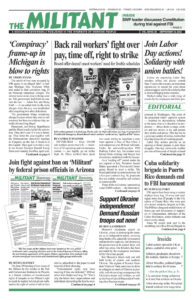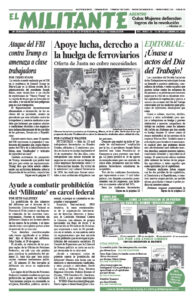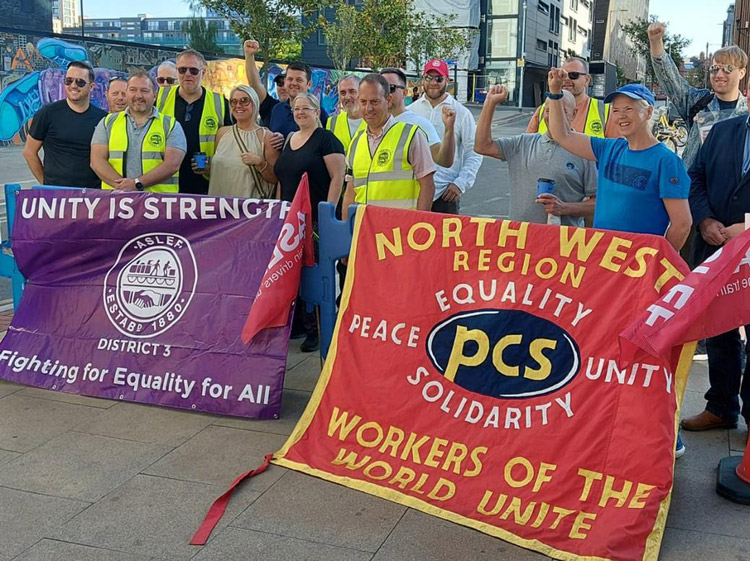MANCHESTER, England — The drive by bosses and their government in the U.K. to put the burden of the capitalist crisis on the backs of working people is fueling union actions across industry, as well as widespread discussion among workers about what we can do to defend ourselves. Workers and our families are being battered by inflation that has soared to 11.7%.
Following several one-day walkouts by 40,000 rail workers in July and August, 115,000 postal workers struck Aug. 26 after Royal Mail bosses imposed a meager 2% pay increase. Three more strike days are planned.
“More people understand why we are taking action now with how hard things are for everyone,” Jimmy Jacob, Communication Workers Union shop steward at the Royal Mail sorting depot on Oldham Road here, told the Militant on the picket line. “It’s important that we stick together and build solidarity.”
A strike by refuse workers in Edinburgh has spread across Scotland. Dockworkers in Liverpool’s container port have voted to strike in the wake of an eight-day strike at the end of August by workers at the U.K.’s largest container port in Felixstowe.
Household energy bills increased a whopping 54% in April and a further rise is due in October. The government has lifted the cap it imposes on what energy companies can charge from 1,971 pounds ($2,286) per household per year, to 3,549 pounds, blaming Moscow’s invasion of Ukraine and a worldwide rise in natural gas prices. Energy companies have jacked up their prices accordingly.
“On my current wages, I will have to work for a whole week just to pay the energy company’s monthly bill,” Tatiana Maylett, a worker at the Pilgrim’s meat-processing plant here, told the Militant.
The government estimates inflation will rise to 18.6% by January. The price of many necessities is already much higher — milk, cheese and eggs went up 19.4% in July; meat by 13.1%. The U.K. has the highest inflation rate within the G-7, a group of governments of the largest imperialist nations.
In the face of this crisis, capitalist politicians of all stripes are offering palliatives to soften the blows, as they defend the bosses’ drive to profit at our expense.
After Boris Johnson quit as prime minister amid a scandal in July, acrimonious debate about economic policy has flared among Conservative Party candidates vying to replace him. Foreign Secretary Elizabeth Truss calls for removing the “green levy,” a Johnson-imposed tax on energy bills, and reversing a recent increase in National Insurance, an income tax. Her main rival, former Chancellor of the Exchequer Rishi Sunak, claims her plans will force millions into destitution and says the government should instead borrow 10 billion pounds to subsidize energy bills. Labour Party leader Keir Starmer calls for extra taxes on energy companies and freezing the government’s energy price cap at under 2,000 pounds per year.
Scotland’s First Minister Nicola Sturgeon calls for nationalizing the energy companies. Her proposal has nothing to do with putting the control of vital energy resources in the hands of working people and our unions, but safeguarding them for the capitalist class as a whole through state ownership.
None of these proposals offer hope to workers and their families. “I’m worried about this energy price rise,” former coal miner Tom Graham told Communist League member Pete Clifford when CL members campaigned in his neighborhood here in Manchester. “I think Labour is right to put a cap on price rises and increase taxation on the energy companies.”
Clifford disagreed. “We call on the unions to fight for automatic cost-of-living adjustments in every contract,” he responded. “When inflation goes up our wages should go up automatically to match every price rise. Our proposal is to rely on our own strength as workers using our unions.” There is no way to prevent bouts of inflation under capitalism, he added, but by joining together workers can fight for protection from its effects.
Graham wasn’t convinced that unions would lead a fight for cost-of-living adjustments. “Maybe, not yet,” replied Clifford, “but as our struggles deepen this course will gain a broader hearing.
“And this is a question for our class worldwide,” he said. “Working people across Europe, the U.S. and elsewhere also face skyrocketing prices.”
Thomas O’Sullivan, a handyman in Manchester, told Clifford he “supported strikes by bus drivers near me. They won 11% through their action, but with inflation rising that can still end up as a cut in real pay. The system is rigged against us.”
“The capitalist ruling class needs to go after our wages and working conditions,” Clifford replied. “Today’s union fights help workers see ourselves as part of a class with common interests. We need to break from the bosses’ Conservative and Labour parties, and build a party of labor that can fight for all working people, a necessary step on the road to overturning capitalist rule and replacing it with workers power.”


